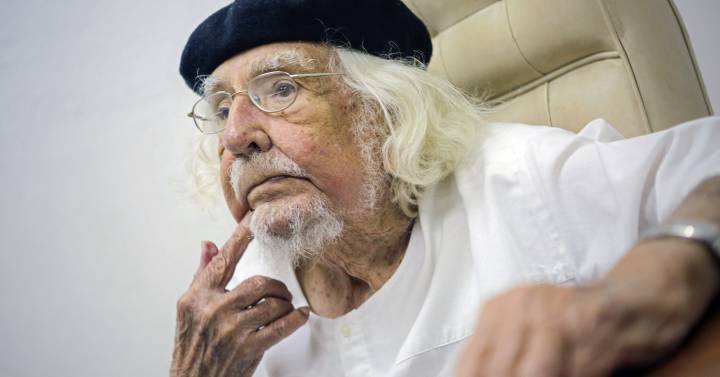In an interview I did when he was still walking alone, on the occasion of his eighty birthday, I found the poet in his office at the Nicar Center in Managua, in the middle of the handmade composition of one of his poems, which would later happen to Be part of Telescope in the dark night . They were small rectangular paper strips. In each one there was only one verse. The poet played with them, as if forming a puzzle. He slid them one by one with his index finger on the table, at chest height covered by the white cotona. And I read them to listen to them. He raised or lowered them, rearranged them, until his poetic instinct, and possibly his musical smell, told him which verse should go in each place. That which the other trapense Ernest Cardinal would translate as an order of the spirit.
It was a way of composing that they possibly practiced some of their American poetic referents, such as TS Eliot and, above all, Ezra Pound, who taught him that everything could fit in poetry (and that it could become a multifocal flow where they fit from historical dialogues to newspaper clippings or advertisements; all as long as they were submitted to the rhythm that circulated them). He is the Cardinal, for example, of the Doubtful Strait and the Cosmic Canticle.
Like Saint John of the Cross, both were poets above all, in love with the erotic encounter they had given up because of the promise of a cosmic orgasm
The last time I talked with him, last Christmas, I asked him curiously if, after having passed a recent episode of encounter with death, he had changed his writing method somewhat. And not. "I don't have a schedule," he told me. That was the same as saying he did it at any time. I read several books at once, most of science ("we are stardust" reaffirmed in his last verses that can be found in the happy complete work that Alejandro Sierra published in Trotta at the end of last year).
I left him sitting by his desk. It was not hard for him to be surrounded by people and be absorbed in his poetry. The last time he was taken to Solentiname Island, he sat in his wheelchair, reading on the deck about a swell that sometimes turns the lake into "a sea of fresh water," as his first discoverer called him. After that occasion when he seemed to die, and even the Pope lifted the sanction imposed by John Paul II, his attitude was that of a man who had gone to take the train on an expected trip and, upon arriving at the station, had Realized that his ticket was for another day. He returned to his home in Los Robles, in Managua. He returned to his books and the game of finding the rhythm of the "Beloved", as San Juan de la Cruz called it, in his writing.
San Juan de la Cruz was the name he gave to a boat with which he fished in Solentiname. He became one with the author of The Night , reading his poetry, more than prose. Both were poets above all, in love with the erotic encounter they had given up because of the promise of a cosmic orgasm. When he felt he was dying, San Juan de la Cruz asked the friars to interrupt the prayers for a dying man and to recite the Song of Songs better , in Spanish. He who "kissed me with the kisses of his mouth", must have resonated like a gale in that cell of Úbeda. Then, despite the fact that his own order had haunted and veiled him, they knew that they had left someone exceptional. And according to the superstitions of the time, some desecrated his body, got rid of his fingers and other parts. Everyone wanted their share of the saint, in a macabre interpretation and vice versa of all that it meant. But he had already made word of high flight (although some of his works were lost along the way).
At the burial of Cardinal, the inquina of an old enemy (the current vice president and wife of Ortega, who wanted to be a poet and envied her figure until she became ill) sent her mobs to interrupt the funeral and try to take a part of the poet. But "of this", as he anticipated in his Epigrams "there will be nothing left for posterity, but the verses of Ernesto Cardenal", now turned into strips of paper flying high to join the rhythm of a stardust.

